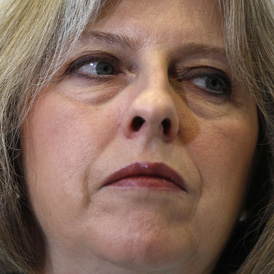Universities ‘complacent’ over tackling radicalism
Home Secretary Theresa May says universites are complacent on radicalism, but the president of the Islamic student body Fosis tells Channel 4 News her comments are ‘disrespectful and sensationalist.’

Theresa May told today’s Daily Telegraph: “I think for too long there’s been complacency around universities. I don’t think they have been sufficiently willing to recognise what can be happening on their campuses and the radicalisation that can take place. I think there is more that universities can do.”
Her remarks come ahead of the publication of the Government’s revised “Prevent” strategy, which was originally launched in 2007 to stop the growth of home-grown terrorism.
Reports on the revised strategy say the Government has identified 40 English universities where there could be a “particular risk” of radicalisation or recruitment on campus.
It is believed the guidelines will say that more than 30 per cent of people convicted for al-Qaeda linked terrorist offences in the UK are known to have attended university or a higher education institution.
Theresa May also criticises the national umbrella organisation representing student Islamic societies, Federation of Student Islamic Societies (Fosis), for what she calls an insufficient willingness to tackle extremism.
Ms May said: “They need to be prepared to stand up and say that organisations that are extreme or support extremism or have extremist speakers should not be part of their grouping.”
Fosis reaction
But the president of Fosis, Nabil Ahmed, told Channel 4 News Theresa May’s comments were “sensationalist” and without substance.
“We have invited Theresa May to our annual conference to actually sit down and engage with Muslim students. We need to avoid sensationalism and have a constructive debate,” he said.
“I do not accept that radicalisation is a problem on campus. We look to security experts on this issue and there is nothing to suggest radicalisation on campus is a widespread problem.”
“Universities Minister David Willetts himself has rejected this notion of a pattern of extremism on campus, Nicola Dandridge, the head of Universities UK, says there is ‘no evidence to suggest universities are a hotbed of extremism.
“These accusations by May are not only sensationalist but they are disrespectful to Muslim students on campus,” he continued.
Mr Ahmed went on to reject the Home Secretary’s claims that “extremist speakers” are invited on campus, adding: “We need a proper debate, and we need free speech. If you’re going to restrict free speech, then it will go underground.”
For the Fosis president, Theresa May’s comments were consistent with a climate of fear and a politicisation of the national security agenda.
“Stella Rimmington, the former head of the MI5, said ministers are using the politics of fear for their own agenda. In light of these comments, my fear is that certain Tory ministers are falling into this trap,” he said.
Among those arrested for terrorism offences who have been linked to British universities is Umar Farouk Abdulmutallab, the so-called “underpants bomber”.
He was detained on Christmas Day 2009 accused of trying to blow up a flight from Amsterdam to Detroit. He graduated a year and a half earlier from University College, London, where he was also president of the student Islamic Society.
But UCL’s own inquiry concluded Abdulmutallab had not been radicalised during his time at university.
Prevent ‘not working as well as it could be’
Mrs May launched the review of the Prevent strategy, which was overseen by the independent counter-terrorism reviewer Lord Carlile of Berriew, last November, saying it was not working as well as it could be.
The £60m Government programme was adopted in the wake of the July 7 bombings, and aims to counter militant Islamism by supporting mainstream Muslim groups which offer an alternative to extremism.
But the Prevent strategy was criticised by some Muslims, who said they feared it was being used to spy on their communities, and by other ethnic groups who believed they were missing out on financial support by comparison.
A Home Office spokesman said: “The Government is currently reviewing the Prevent programme, which isn’t working as well as it could.
“We need a strategy that is effective and properly focused. The findings will be published shortly.”
